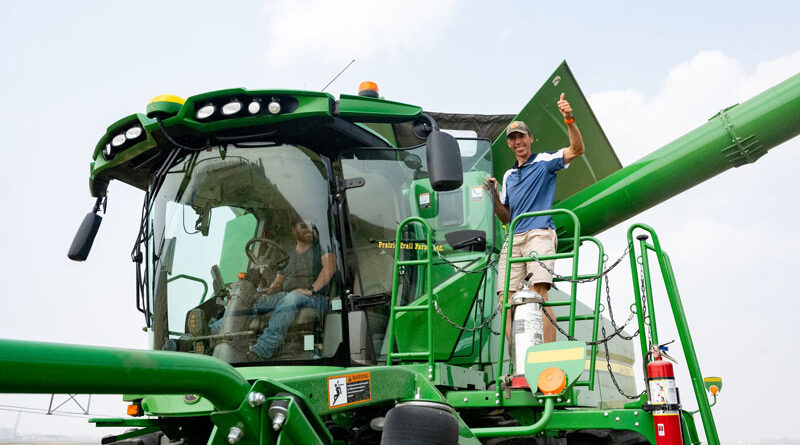WAHS harvests farming for hospice crop
By John Watson Local Journalism Initiative Reporter

Joe Lepage Photo
The Wheatland and Area Hospice Society (WAHS) hosted their harvest event, Aug. 15, as well as a meal in the field, celebrating the rye crop and fundraising efforts this season.
“It is a joint community event with six combines that came, and we had our partners at Brandt and Premium Ag there, and some local farmers who helped us harvest the crop,” said Teri McKinnon, one of the directors on the WAHS board.
This year marks the fifth year that Farming for Hospice has taken place, hosted by the WAHS, which continues to raise money to contribute towards the ongoing Wheatland Lodge and hospice project, aiming to be constructed in Strathmore.
“We are getting closer to our goal with this fundraising; it is our major fundraising event of the year. We are getting closer to the $6 million mark which will pay for the build at Kinsmen Park, as well as most of the equipment and furnishings,” said Joni McNeely, chair of the WAHS. “We are very, very grateful and humbled by the remarkable support of the community, the towns, villages, and the county residents.”
The land used to seed and develop the rye crop was donated to the WAHS by Nutrien, similar to how Farming for Hospice has been operating for the last several years.
Local farmers volunteer their time and equipment to help the WAHS prepare the land, seed, spray, fertilize, and harvest the crops. The irrigation necessary for cultivation is also provided by Nutrien.
“Now, we harvest it and then the commodity, the crop itself, we sell. We sell acres, and each acre is $300, but that money is a charitable donation that goes to cover some of those input costs for fertilizer and stuff,” said McKinnon. “The commodity, the crop itself, the money that we make from that commodity goes directly to the Wheatland and Area Hospice Society and our fundraising goals.”
The rye crop had been presold to Origin Grain prior to harvest. McKinnon added Origin Grain is an organization which ensures the crops and plant material goes into the local food supply within Alberta.
In addition to the Farming for Hospice annual harvest, Drew Gregory hosts an event each November in order to aid the hospice society in selling acres for the following year’s seeding and harvest.
“I do not think we will stop this initiative once we have hit our fundraising goal because we will continue to support and nurture the hospice once it is built. Four walls is one thing, but service and care and all the extension of the palliative needs, we will continue to support that,” said McKinnon.
The next step for the WAHS is to see their application for funding from the Province of Alberta approved to help further prepare for shovels to hit the ground.
